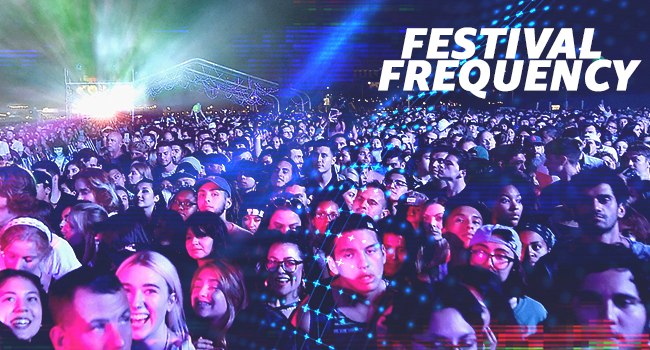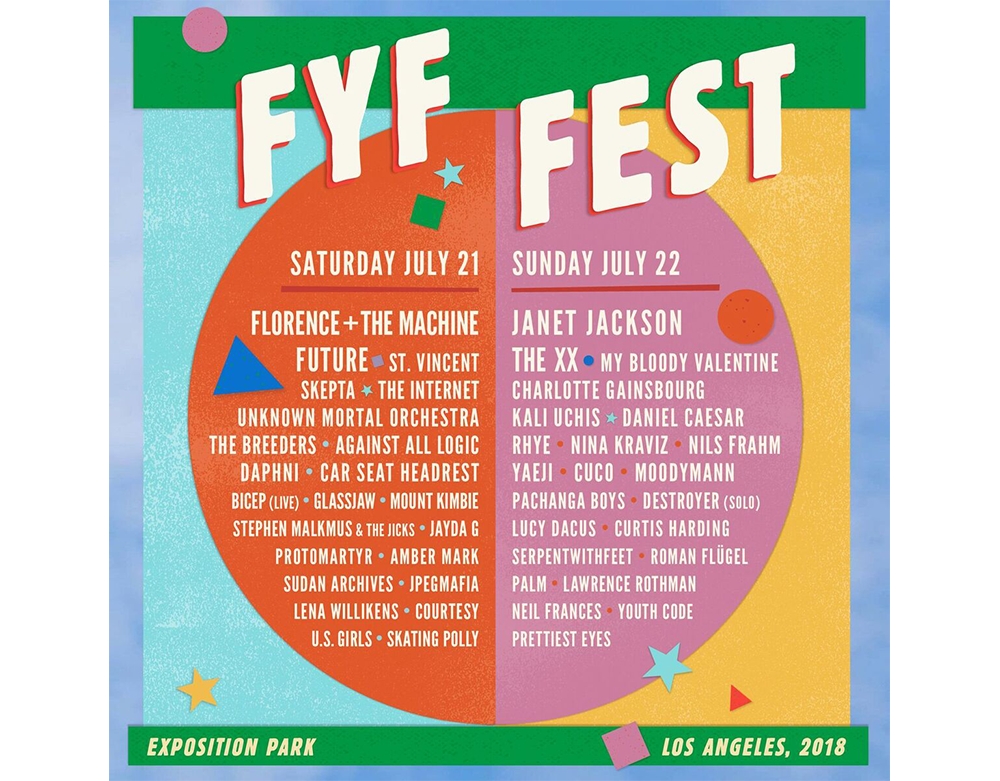
Festival Frequency is a monthly look at music festival-related topics that step beyond the shadow of the Ferris wheel, discussing everything from the performances to the inner workings that make this a global phenomenon.
“The best weekend of the summer.”
This is how FYF Fest would often describe itself in its social media posts over the last decade. The sentiment felt like direct communication with the festival’s founder, Sean Carlson, who longed for his little LA festival to become a sort of transformative experience for the young people that attended. In the early years, it was less a question of creating meaningful memories and more an issue of just getting people through the door, as logistical problems plagued the burgeoning event, and unforeseen issues with dust, plentiful food, and security screening earned the fest more of a reputation as the biggest clusterf*ck of the summer early on.
But things slowly changed, and within the last five or so years, FYF Fest became one of the best festivals in the country. Having an impressive lineup was never a problem, and neither was being affordable. The first year I attended, 2009, it cost $20 for a single day, and was headlined by the Black Lips and Tim and Eric. Even then, the rest of the bill, with the likes of Fucked Up, No Age, Converge, Wavves, Woods, and many more, made due through the taste level of the bookers. It didn’t need the biggest names, it was just a well put together program. And each year after, the festival seemed to outdo itself. So when Goldenvoice came along to help with logistics, FYF Fest finally became that “best weekend of the summer” that it strove toward for so long.
But this year, for the first time in 15 years, there will be no FYF Fest. For many, it might feel deserved, following founder Sean Carlson’s dismissal from the Goldenvoice family just months ago after the revelation of sexual misconduct. Carlson’s exit left the fest in limbo, with many unsure whether it would return at all until it was announced that the festival would not be rebranding or taking a year off. A new booker, Jennifer Yacoubian, was appointed, with some praising the decision to replace Carlson with a woman after what he had been accused of doing. But the reality was also that Yacoubian was the right person for the job, and the media and music world alike beamed whenFYF revealed its lineup last month.

Indeed, there was so much to like. In a time when many of the biggest festivals in the country have a hard time getting non-male performers anywhere near the top of the lineup, FYF Fest once again was the poster child for diversity. Following a year in 2017 when half of its headliners (Bjork and Missy Elliott) identified as female, FYF went one further and managed 100% women headliners for 2018, with Janet Jackson and Florence And The Machine leading the charge. Even in the undercard, artists like St. Vincent, The xx, Kali Uchis, and Charlotte Gainsbourg offered more prime slots for women than some fests have served in their entire history. Elsewhere there was the rap of Future, the noise of My Bloody Valentine, and a boatload of under-the-radar indie, electronic, and hip-hop to maintain the festival’s identity as a music discovery event.
The cancelation of FYF Fest this year is being attributed to one major factor: poor ticket sales (via Billboard). Though the fest sought to control their own narrative with a more vague explanation, including an awkwardly phrased, borderline virtue signaling statement that claimed “many women and men” worked tirelessly for years on the event and felt like they couldn’t put on a festival in line with expectations, the bottom line was that for some reason, the festival docket that FYF was presenting in 2018 was not being bought. Months ahead of the actual fest, which was set to take place in late July as it had for the previous couple years, the powers that be determined that this year was not possible to save.
— FYF Fest (@FYFFEST) May 6, 2018
You didn’t need to go much farther than Twitter to get armchair industry analysts voicing their explanations for the failure. Was this a reaction to the mediocre rising talent emerging in the music world? The result of a toxic brand that would have been better off pivoting to a whole new festival and distancing themselves from their now troubled legacy? Another example of the festival bubble bursting? A reaction to the rising costs of the fest and a losing of the identity that it had established for themselves? Or the perfect storm of all of these sinking what appeared to be a mighty festival juggernaut?
When FYF Fest released its lineup last month, it was the kind of bill that felt above criticism. As much as there was to admire about the diversity, it was also a docket that could be looked at and easily questioned whether or not it would sell. The four big acts — Florence, Janet, Future, and The xx — all didn’t fit perfectly into the FYF aesthetic, with Janet a little seasoned, and Florence, The xx, and Future a little mainstream. These aren’t exactly opposed to what FYF does, but it is telling that Outside Lands, a festival that is decidedly more rooted in mainstream culture, has all of these acts (except with Jamie xx instead of The xx) on its own lineup. For a festival that for so long had stood out for its adventurous booking, to have a festival in its own state put together a nearly identical top line felt like a major blow. What was it about this FYF Fest that felt special?
For a long time, it was the taste level and price that differentiated this event from competitors. But at $250 for a GA two day pass, FYF Fest was no longer much different than its competitors. Take into account that last year, with an additional day, set people back $295. But look at the difference. Last year brought four headliners — Missy, Bjork, Frank Ocean, and Nine Inch Nails — and nearly all of them felt like rare or special appearances. And below that, was the second tier of artists — A Tribe Called Quest, Solange, Iggy Pop, Erykah Badu, Run The Jewels, Flying Lotus, Anderson Paak, and MGMT — that added value to the event. This year only offered a pair of headliners and a second tier of only two additional artists per day. After that, it drops off a cliff.
And of those announced, only My Bloody Valentine feels like a rare appearance. St. Vincent, The xx, Future, and even Janet Jackson have performed a number of local concerts in the last couple years, while Florence has already scheduled a warmup LA date for May. It just didn’t feel like the same event that brought Missy out of the woodwork, that could get Kanye West to fill in for Frank Ocean, or that could late have Frank produce one of the most unforgettable concert experiences of the last several years. It felt a little pedestrian.
Without explicit knowledge of how other festivals are selling, it is hard to say whether this is part of a more worrisome trend. It is interesting that Outside Lands has not sold out yet, even when it often does well in advance of the fest. It could be on the verge of selling out and about to do just that. Over in Chicago, Lollapalooza has been called out for slow sales as well, though their four-day passes did sell out shortly after that article was published. And even if there is a waning interest in festivals as a whole, it’s not like we see comparable festivals canceling in the same manner as FYF. There is a precedence for festivals canceling before the event, and it doesn’t seem to be fluctuating in recent years. Most importantly in FYF’s case, though, is the fact that canceling doesn’t bode well for the festival’s longterm health. Many never come back.
The most troubling aspect of the FYF Fest cancelation is how it could be interpreted as a blow for diversity. When the typical argument for including women at the top of festival lineups is that women don’t sell, seeing an event that so explicitly branded themselves for its diversity fail is discouraging for advocates. But this is also a brutal reminder that the festival talking points that the media and music professionals care about mean very little to the ticket-buying public. Festivals can sell whether they are inclusive or not. And ticket buyers aren’t really concerned about the transgressions of a behind-the-scenes figure they’ve never heard of. They care about getting value for their ticket price, about seeing a bunch of artists together in one place that they couldn’t get somewhere else. And FYF Fest in 2018 didn’t provide that base-level need.
If there isn’t a way for festivals to book a roster of artists that displays a similar demographic to the people actually attending the event, where women and people of color are included inherently in their musical statement while also, you know, providing a festival that people will actually want to buy tickets for, maybe the festival complex is more broken than we all think. And to think that the festival world won’t move on without FYF is to be horribly mistaken. Many with their hearts set on seeing Janet and Florence can make the trip north to San Francisco and buy tickets for Outside Lands, while The Growlers announced today the return of their Beach Goth brand by moving the festival up two months on the calendar. It will now be held on August 5 in an undisclosed LA location. You can bet that some of the artists now without LA appearances after the FYF cancelation will pop up on that lineup.
Goldenvoice even has its own June event, Arroyo Seco, that can please the contingent that is aging out of FYF with appearances from the likes of Jack White, Kings Of Leon, and Neil Young. Music fans in LA won’t be at a loss at how to spend their refunded ticket money, and will just find another block on the calendar to label their “best weekend of the summer.” But if diversity at festivals is actually as important as we say it is, and the desire is present to create more inclusive environments, we all need to get out there and actually buy tickets to the ones doing it right. The responsibility goes both ways, and without it, it’s hard to imagine things getting better.






